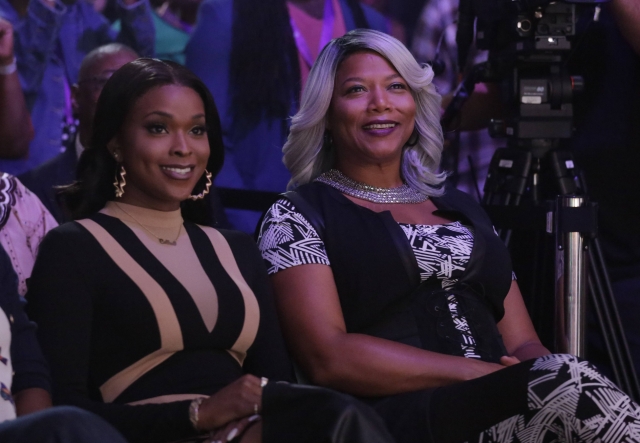“Anything I want, Anything I need, I’m able. So as far as what I’m bringing to the table? I bring me.” That anthem of self-determination is more than Star’s opening theme song; it’s a mantra.
Last winter, the musical-soap opera spin off of Empire premiered with little fanfare. I know I just lost a chunk of you with the mention of Empire, but just wait! Star succeeds at forefronting women’s stories in ways that Empire, despite the prowess of Taraji P. Henson, has struggled with. It also it gave Black trans actress Amiyah Scott the platform to make history as the first out trans person to star as a series regular on network television. The second season starts tonight on Fox, so let’s dig into the first season while we still have time!
In the pilot episode, we meet Star, just shy of her 18th birthday and about to age out of the foster care system. She’s applied for expedited release in the interest of finding her 16-year-old sister, Simone, who is also in the system. With the paperwork filed, she buys a one-way ticket from Pittsburgh to Harrisburg, PA. When she finds Simone, she is in the middle of being raped by her foster father.
Star motions for her sister to be quiet. She closes the door, visibly shaken, but gathers herself. Then she heads directly into the kitchen of a house she’s never been in before and grabs the largest butcher knife she can find. Star stabs him in the back, not stopping until he is seemingly dead and no longer moving. Then she grabs her sister, steals his car, changes the license plates, and together they head off in search of their musical dreams in Atlanta.
That’s it. That’s the first ten minutes of the show! Kill the dude committing violence against my sister and Let’s Be Out! We Have More Important Dreams to Accomplish!
You can see why this show stands out from the pack.
Star is delightfully feminist, in that it takes the ambitions and agency of teenage girls, low-income girls, and girls of color seriously. It takes the life of a black trans young woman seriously. It’s hard to be a girl in this country. It’s harder still to be a girl who is poor or black or both. Societal rules were not set up for you to win; they were fundamentally designed for you to lose. Sometimes, the only choice is to break those rules. Expose the physical and social violence of patriarchy and kick its door down with both feet. HARD. And then go out there and take what’s yours. I don’t remember the last time I saw a show on network television that embraced this brand of dark, unrelenting Girl Power.
Star and Simone, along with Alex, the third member of their aspiring girl group, love each other. They bicker like sisters and fight to make their music work against all odds while living three in a bedroom in a modest apartment above Queen Latifah’s hair salon. Queen Latifah plays Miss Carlotta, Star and Simone’s godmother. Star’s laser focus on the group’s survival is positively Slytherin; Simone fights for sobriety from the self-medication of drugs and alcohol that she used to cope with her past traumas; Alex left the safety of her life as the child of a famous rockstar and is now forced to deal with realities of blackness in America away from her relatively secure bubble. They find a manger in Benjamin Bratt’s Jahil, who is sleazy and undesirable at his job but a worthwhile confidant. Miss Bruce, the gender queer femme hair stylist at Miss Carlotta’s salon, perfectly punctuates the drama like a greek chorus.

Star, Alex, and Simone perform in a fantasy sequence.
Structurally and narratively speaking, Star is a hot mess. It chews through plot at a dizzying pace; there are very few lasting consequences. Each episode ends on a cliffhanger. It’s perhaps the most deliciously terrible, entertaining, batshit crazy hottest mess that I watched last year. That said, the original music, performed with more than a hint of magical realism, is very catchy, particularly if you are a fan of R&B groups in the tradition of Destiny’s Child, EnVouge, TLC, or 5th Harmony. Queen Latifah’s wigs get brighter and more fantastical with every turn. More than anything, Amiyah Scott’s Cotton rises above the show’s weaknesses and walks away as one of the first season’s breakout stars.
There are a lot of reasons to love Amiyah Scott (for instance, can we talk about how her social media handles are @KingAmiyahScott?! KING! Go get that crown boo!). The unfathomably small pool of trans parts on television that actually go to trans women so often are shared between a handful of regular actresses, and with this role, Amiyah Scott should join that group. She’s also off-the-charts talented. Her portrayal of Cotton feels authentic and well lived-in. She’s grounded in a narrative world otherwise filled with camp. The screen crackles with heat around her and she invites you in to share the space.
The first time we meet Cotton, it’s clear that she is loved and supported. She works the phones at her mom’s salon and lives in the upstairs apartment with Carlotta and the girls. She pals around with Miss Bruce. She also moonlights as a sex worker to save money for her gender affirmation surgery. Carlotta worries for her safety, but mostly looks the other way. Star and Cotton see a lot of themselves in each other, and become fast friends. Jude Demorest, the actress who plays Star, correctly names the duo as the “Thelma and Louise of the series.” Both have steely determination to change the cards they’ve been dealt by life, no matter what action it may take.

Amiyah Scott as Cotton on Star.
Star doesn’t diminish or malign Cotton’s sex work. When Alex balks at the idea of working at a strip club, Simone counters: “Look at Kim Khardasian. I love her. She’s shown every hole in her body, and now she’s famous.” Kim Khardasian has a lot privileges that have never been granted sex workers in this country, but the underpinnings of Simone’s 16-year-old logic is clear. Star joins Cotton at her club and later finds her being abused by one of her Johns in the back alley.
Star jumps on the man’s back, she kicks him in the groin, and when he doubles over she tells Cotton to “get your money.” Cotton grabs his whole damn wallet, and the girls triumphantly walk away arm-in-arm. While its refreshing to see erotic dancing and sex work shown without the weight of moral judgement, I can’t shake the 2012 GLAAD statistic that one-fifth of all trans women characters on television are depicted as sex workers. Star goes a long way to show Cotton’s life beyond a stereotype, but it still doesn’t escape the shadow of that outsized statistic.
Cotton and Carlotta’s relationship becomes more fraught as the first season progresses. Carlotta is supportive of Cotton, but she’s not perfect. Early on Cotton is occasionally misgendered and referred to by her birth name, most often by her mother. It’s important to note that almost every time this happens, it is immediately chastised and framed to the audience as 100% wrong. Still, misgendering a trans woman is an act of violence. It is dehumanizing. I won’t defend it. There are other choices on television that could be made.
Carlotta’s pastor boyfriend, played by R&B singer Tyrese, exacerbates their underlying tensions. Pastor Bobby joins the family for Sunday dinner, and Carlotta makes it clear that she won’t eat without her daughter at her side. Later the pastor tries to “save” Cotton and it’s as awful as you imagine. What starts off as a family prayer goes off the rails when pastor Bobby lays hands on Cotton and asks that God bring Carlotta’s “son” back. Carlotta is horrified, she wants to intervene, but turns coward. It’s too late. The pastor needled Cotton’s scariest, darkest, self-doubts. She considers killing herself that night; luckily Star intervenes.
Cotton’s no longer safe in her own home. Carlotta apologizes, begging, but Cotton does the right thing and moves out. Once again, Amiyah Scott really digs into the material given to her. The emotional gold that she strikes is raw and painful and absolutely should be applauded. I don’t like seeing suicide attempts on television. I worry about the real life repercussions, especially for already vulnerable communities. I was happy that ultimately Cotton choose to protect herself. Sometimes, especially for queer and trans folks of color, our families are not safe for us. No matter their intentions. Cotton recognized that what was best for her and Carlotta was space.
Did I mention that Cotton also has a boyfriend? Her relationship with Elliot starts off in big romantic sweeps. He wines her and dines her, takes her shopping. He’s happy to meet her mother and date her out and in the open. We spent time this summer discussing the importance of trans love stories on network television, and I wanted for Elliot to be a part of Cotton’s happiness. Unfortunately, Elliot grows controlling. He tries to prohibit her from her sex work, unwilling to understand why it’s vital for Cotton. He ends up cheating on her and Cotton catches him mid-act. She’s fed up: with him, with everything that’s been stacked against her. She steals his checkbook and uses it to pay for her surgery.

Cotton and Carlotta
The season finale centers in part on Cotton’s gender affirmation surgery. She’s at peace and simply radiant. All of the girls are excited for her. Alex holds her hands over her mouth as a loving giggle shakes over her body and beams, “It’s going down!” Star squeals, enveloping her friend into the grizzliest of bear hugs, “Today is THE DAY!” Simone holds Cotton’s hand, leans into her side, and won’t let go.
I’ve never seen this before. I’ve never seen gender affirmation surgery framed so lovingly, like the life-saving and life-changing measure it can be for some trans women. I’ve never seen on television a trans woman head off into this surgery warmed with the support of her loved ones.
At the hospital, Cotton goes into surgery with both of her parents at her side, telling her that they love her. Her face is washed from its armor of make up, her hair pulled back; she looks so vulnerable. Carlotta grabs her hand tight. She’s there, ready to see Cotton through whatever comes next.
And Cotton’s going to need that support, because when she wakes up after surgery, she is handcuffed. She’s under arrest for Grand Theft. Cotton was born in jail, stemming from Carlotta’s own arrest for a small robbery she committed while pregnant. Mother and daughter, both women left with little option other than commit survival crimes to change their life. Star knows that some women have to make impossible choices, that they hustle to survive. They do what they have to get the job done. And the show doesn’t judge them for it.
Trans women on television are almost always written and framed as objects. The audience is told the they can be easily controlled and held. Cotton burns all of those assumptions to the ground. She is nobody’s property: not her mother’s, not her ex-boyfriend’s, and not society’s. The difficult decisions that she has made are her own and she stands by them fervently.
Here’s something else to think about: By clocking in 12 hours in the first season, and already ordered for a full second, Amiyah Scott will have had more dedicated plot on a single show than any other trans actress in network television history. I have a reasonable distrust of Lee Daniels’ properties given Empire’s rocky history with queer characters, but Star has thus far been compelling and I’m excited to see where Cotton goes next. If nothing else, I know it’s going to be one hell of a ride.
Star returns on FOX tonight (Wednesday) at 8/7c on in a two-hour crossover premiere with Empire. The show continues at 9pm Wednesdays after that point, starting next week. If you’d like to catch up, the first season is available to stream on Hulu.



Queen Latifah is one of my problematic favorites
Honestly, that is such a good way of describing her.